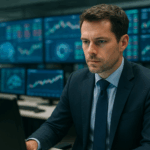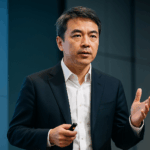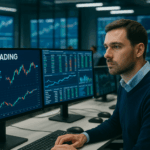As the finance industry grapples with the implications of artificial intelligence (AI), a new concern has emerged: the phenomenon of “market crowding.” This occurs when a majority of market players adopt the same trading strategies, often driven by AI recommendations. The result can be a destabilized market, where traditional wisdom—like “buy low, sell high”—is rendered ineffective as investors blindly follow trends dictated by algorithms.
Richard Rothenberg from the Global Algorithmic Institute recently engaged with Miquel Noguer i Alonso, founder of the AI Finance Institute, during an event at Stanford. They discussed the pressing issues surrounding AI’s role in finance, emphasizing the need for vigilance amid AI’s rising influence. “Our loans, our deposits, our portfolios are there,” Noguer i Alonso remarked, stressing the need for critical thinking and due diligence in the financial sector.
The Risks of Market Crowding
Market crowding raises significant risks, especially in an era where AI tools are increasingly becoming the go-to resource for traders. Investors, influenced by AI algorithms, may end up in large groups taking identical positions. In such scenarios, the unique opportunity for profit diminishes, leading to what Rothenberg describes as a “collapse” in market integrity. The analogy of a casino bet—where outcomes are predetermined by algorithms—illustrates the potential futility of trading in overcrowded conditions.
Both speakers noted that despite the hedging strategies employed by hedge funds, a prevailing consensus among traders could mimic movements seen in retail phenomena like the “AMC Apes” movement during the GameStop frenzy. This collective action could raise alarms for market regulators, who may need to intervene as dynamics shift.
AI’s Fiduciary Responsibility
Another critical point raised during the discussion was the fiduciary responsibility of financial institutions. As banks increasingly utilize AI, concerns arise about the complacency that may come from simply integrating tools like ChatGPT. For example, some European banks have reportedly provided bonuses to managers just for employing ChatGPT in their workflows. Noguer i Alonso cautioned that this could lead to “laziness” in due diligence, a risk for institutions managing substantial financial assets.
Rothenberg emphasized that traditional financial institutions generally maintain a “low degree of appetite for standard deviation,” making it crucial for firms to be aware of AI’s limitations. Issues like algorithmic “hallucinations” can have severe consequences when billions are at stake.
Enhancing Algorithms with Better Data
In their conversation, the experts also touched on the importance of high-quality data. Noguer i Alonso pointed out that creating synthetic datasets carefully could enhance the capability of algorithms. He echoed the principle of “garbage in, garbage out,” highlighting the need for rigorous taxonomies in financial data handling. This careful approach can elevate algorithm performance and mitigate risks associated with poorly informed trading strategies.
However, he also expressed concern regarding future regulations. The U.S. Securities and Exchange Commission is apprehensive about AI’s role in altering market “ecology.” If many investors start following a single AI recommendation—like a stock picker—this could lead to concentrated market positions, prompting regulatory scrutiny.
The Path Forward
Despite these challenges, Noguer i Alonso advocated for diligence and proactive engagement with AI tools. He argued that while AI presents a plethora of potential algorithms, it requires human judgment to ensure robust portfolio management. “You need to do much more work,” he stated, emphasizing that AI should assist rather than replace human oversight.
Ultimately, critical thinking, continuous learning, and a commitment to due diligence will be vital for finance professionals as they navigate the complexities introduced by AI. As the financial landscape evolves, staying vigilant against market crowding and making informed decisions will remain paramount for success.
 AMA Advocates for Physician Oversight in AI Integration to Ensure Patient Safety and Data Security
AMA Advocates for Physician Oversight in AI Integration to Ensure Patient Safety and Data Security Sakana AI Secures $135M Series B, Targets Japanese Finance and Defense Markets
Sakana AI Secures $135M Series B, Targets Japanese Finance and Defense Markets Bain & Company Launches AI Innovation Hub in Singapore to Boost Regional Solutions
Bain & Company Launches AI Innovation Hub in Singapore to Boost Regional Solutions Madison Finance Committee Adopts 2026 Employee Handbook Changes, Modifies Discipline Process
Madison Finance Committee Adopts 2026 Employee Handbook Changes, Modifies Discipline Process Goldman Sachs Predicts 13% Drop in Oil Prices by 2026 Amid Supply Glut Concerns
Goldman Sachs Predicts 13% Drop in Oil Prices by 2026 Amid Supply Glut Concerns











































































